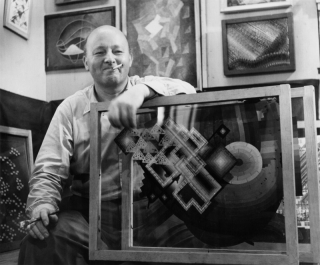Oskar Fischinger: Music and Motion
Date: 5 December 2003 | Season: Oskar Fischinger
OSKAR FISCHINGER: MUSIC AND MOTION
5—9 December 2003
London Goethe-Institut
A TRIBUTE TO THE PIONEER OF ANIMATION, ABSTRACT CINEMA & VISUAL MUSIC
“Decades before computer graphics, before music videos, even before Fantasia, there were the abstract animated films of Oskar Fischinger (1900-1967). He was cinema’s Kandinsky, an animator who, beginning in the 1920s in Germany, created exquisite ‘visual music’ using geometric patterns and shapes choreographed tightly to classical music and jazz.” (John Canemaker, New York Times)
Oskar Fischinger is one of the masters of animated film and an influential pioneer of abstract cinema. Though fiercely independent and resolute, Fischinger spent periods under contract to major studios including Paramount, MGM, and Orson Welles’ Mercury Productions. During his brief tenure at Disney, he had some early involvement with Fantasia, which diluted, but popularised, many of his theories about the confluence of music and visual movement.
Born in Gelnhausen, near Frankfurt, in 1900, Fischinger trained as an engineer and, becoming interested in the newly emerging avant-garde cinema, invented a wax-slicing animation machine for creating and photographing abstract imagery. Moving to Munich and later Berlin in the 1920s, he began to make his own experimental films, participated in ‘light shows’ with composer Alexander László and did special effects for Fritz Lang’s Frau im Mond. His early, hand-drawn Studies, in which abstract or graphic shapes oscillate and transform, closely synchronised to gramophone records, were among the first examples of ‘absolute cinema’. The 1930s were successful years with public and artistic acclaim, frequent screenings and advertising commissions, leading to an invitation to Hollywood from Paramount Studios. Working with photography, silhouettes, liquids, oil painting, models and charcoal drawings, Fischinger achieved a synthesis of sound and vision, anticipating what later became the music video.
During his years in America, his unique and colourful ‘visual music’ developed through more complex techniques and innovations, and Oskar received the recognition of his peers and support from the Solomon R. Guggenheim Foundation. In later years he turned to painting as film became more expensive and problematic to produce. Fischinger died of a heart attack in Los Angeles, 1967, after which his artistic legacy was secured and promoted by the tireless work of his devoted widow Elfriede and scholar Dr. William Moritz, whose definitive biography of Oskar will be launched at this event.
Special Event – Book launch “Optical Poetry: The Life and Work of Oskar Fischinger”
Saturday 6 December 2003, at 6pm
Free drinks reception courtesy of John Libbey Publishers to celebrate the publication of Dr William Moritz’ long awaited, definitive biography of Oskar Fischinger. This book, and video tapes of Fischinger’s work released by Re:Voir, will be available for sale over the weekend.
The two programmes of films by Oskar Fischinger will also be screened at Dundee Contemporary Arts and Glasgow Film Theatre.
Please Note: This programme now travels under the title “Optical Poetry: Oskar Fischinger Retrospective” and is distributed by the Center for Visual Music.
Photograph of Oskar Fischinger © Center for Visual Music, all rights reserved.
